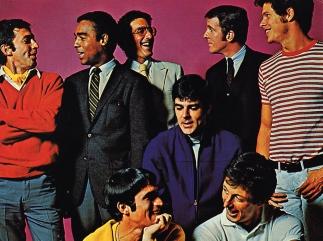“History is so important,” says filmmaker Crayton Robey. It may sound like an obvious statement, but maybe not in the queer community, where lightning-short attention spans make Madonna’s last album seem like serious archival research.
Robey cleverly points this up in the beginning of his latest documentary, Making the Boys. His thoughtful, feature-length film examines the story behind — and lasting legacy of — Mart Crowley’s landmark play (and film) The Boys in the Band. Robey does a few gay-person-on-the-street interviews, only to find that many have never heard of the play.
The play, of course, became an overnight sensation after it premiered off-Broadway in 1968, when America was in upheaval and New York’s queer community was one year away from its Stonewall uprising. As the doc indicates, the play became a huge hit, running for several years. And the film version, directed by William Friedkin, came but one year after Stonewall, making it an incredibly accurate barometer of the times.
Robey interviews a number of the key players in The Boys in the Band saga, showing us how playwright Crowley worked his way into Hollywood’s high society of the ’60s. After working as Natalie Wood’s assistant, they became fast friends and Wood introduced him to her social circle. Soon enough, Crowley was sunning at Roddy McDowell’s beachfront estate with the likes of Tab Hunter, Rock Hudson, Lauren Bacall, Judy Garland and Sal Mineo. (Robey includes home-movie footage of some of the parties.) Crowley would write a sitcom for Bette Davis (!), with the part of a wisecracking gay sidekick who was to be played by Paul Lynde. The network green-lit the pilot but had a woman play the Paul Lynde part instead.
Then Crowley began to write The Boys in the Band, a play that unapologetically and brazenly examined the tortured lives of a group of gay friends, alternately mired in alcoholism, internalized homophobia and/or denial. The play immediately polarized the queer community: was this an accurate insight into the lives of gay men, in a decidedly non-liberated world? Or was it yet more homophobia, underlining our own marginalized place in the world while comforting bigoted straight audiences? As famous playwright Edward Albee says during an interview, “Straights were so happy to see people they didn’t have to respect.” This was the dawn of the positive-image debate that carries on to this day.
The New York-based Robey has a funny story about how he first encountered The Boys in the Band, when, in a Texas high school in the ’90s, he was caught kissing another boy by a teacher. The teacher took them into his office and gave them each a copy of The Boys in the Band and asked them to read it and tell him what they thought. “The debate started right away for me,” Robey recalls. “I loved it, but the boy I’d kissed hated it. I liked that there was a group of gay men, and that they were all there for each other in some way.”
Robey interviews a who’s-who of queer intelligentsia, including Larry Kramer, Tony Kushner, Terrence McNally and Paul Rudnick, as well as straight friends of Crowley, Robert Wagner and the late author Dominick Dunne. (And in what seems like another tepid step toward officially coming out, former New York mayor Ed Koch also makes a fleeting cameo.) What emerges is a powerful meditation on the hostility gays faced at the time, and the ways in which works like The Boys in the Band helped to change things.
Sadly, the actors in the film didn’t fare so well. Robert Moore was a well-known director who helmed the original stage production, but when the film was made, he was set aside for William Friedkin (who would later direct The Exorcist and Cruising). But Friedkin and Crowley resisted replacing the cast with name Hollywood stars, so the film retained the brilliant (if no-name) cast. And that ensemble, notably, was almost entirely made up of gay actors. Some declined into addiction as the roles dried up — with a number blaming their notoriety as being part of that landmark gay play for their failure. The final moments in the film remind us of a struggle no one could have foreseen in 1970: most of the cast would ultimately die of AIDS-related causes.
Robey says he is thrilled that audiences of all ages are connecting with Making the Boys on the film-fest circuit. “Getting people to connect with that time has been very powerful.”
Making the Boys screens Sat, Nov 6 as part of Montreal’s Image+Nation Queer Film Festival, which runs from Oct 28 – Nov 7.

 Why you can trust Xtra
Why you can trust Xtra


